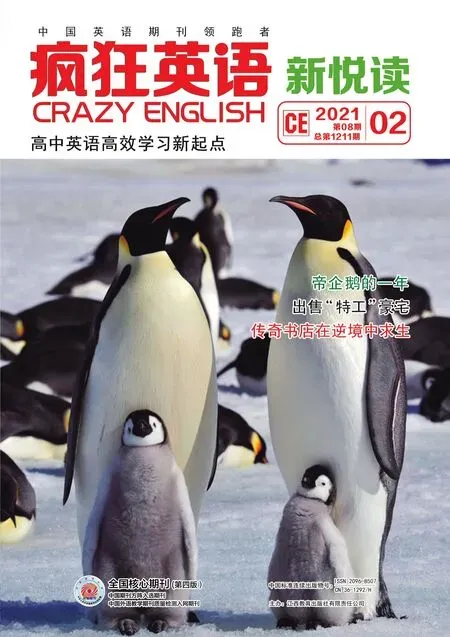Task 5
本刊试题研究中心
阅读下面的材料,根据其内容和所给段落开头语续写两段,使之构成一篇完整的短文。 续写的词数应为150 左右。
One fall, my wife Elli and I had a single goal: to photograph polar bears. We were staying at a research camp outside “the polar bear capital of the world”—the town of Churchill in Manitoba,Canada.
Taking pictures of polar bears is amazing but also dangerous. Polar bears—like all wild animals—should be photographed from a safe distance. When I'm face to face with a polar bear, I like it to be through a camera with a telephoto lens. But sometimes, that is easier said than done. This was one of those times.
As Elli and I cooked dinner, a young male polar bear who was playing in a nearby lake sniffed,and smelled our garlic bread.
The hungry bear followed his nose to our camp, which was surrounded by a high wire fence. He pulled and bit the wire. He stood on his back legs and pushed at the wooden fence posts.
Terrified, Elli and I tried all the bear defense actions we knew. We yelled at the bear, hit pots hard, and fired blank shotgun shells into the air. Sometimes loud noises like these will scare bears off.Not this polar bear though—he just kept trying to tear down the fence with his massive paws (爪子).
I radioed the camp manager for help. He told me a helicopter was on its way, but it would be 30 minutes before it arrived. Making the best of this close encounter (相遇), I took some pictures of the bear.
Elli and I feared the fence wouldn't last through 30 more minutes of the bear's punishment. The camp manager suggested I use pepper spray. The spray burns the bears' eyes, but doesn't hurt them.So I approached our uninvited guest slowly and, through the fence, sprayed him in the face. With an angry roar(吼叫), the bear ran to the lake to wash his eyes.
Paragraph 1:
A few minutes later, the bear headed back to our camp.________________________________

Paragraph 2:
At that very moment, the helicopter arrived.__________________________________________


